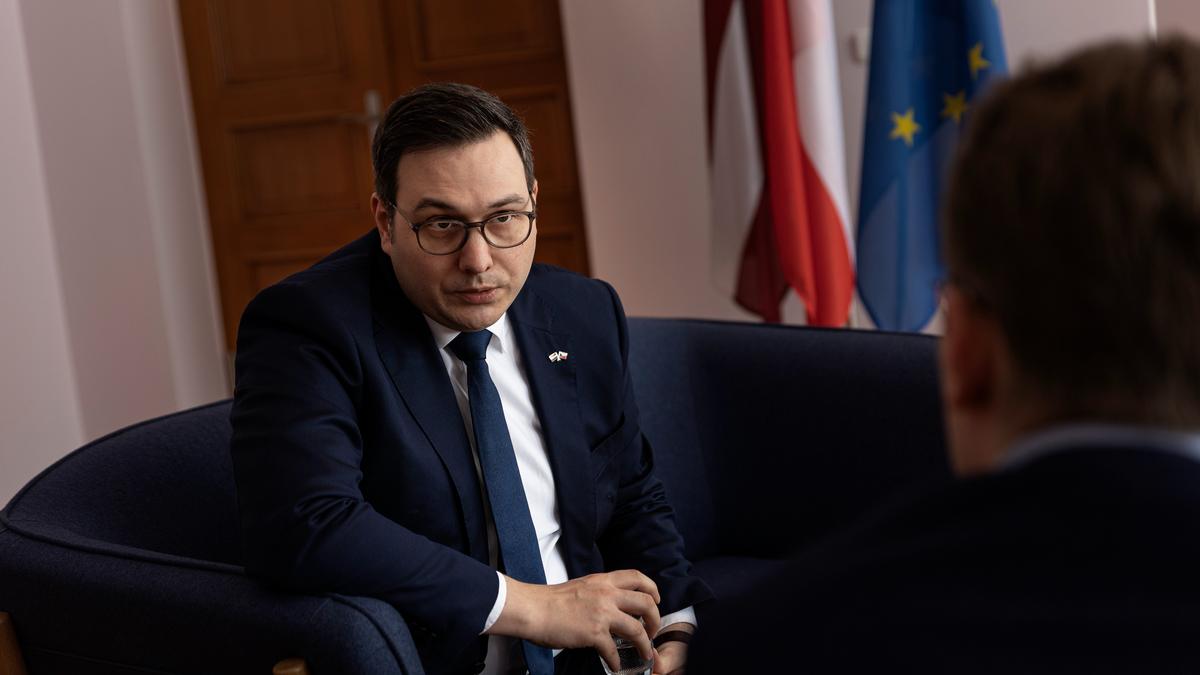In the latter half of 2022, the Czech Republic took on the presidency at the Council of the European Union — amid the ongoing aggression of Russia against Ukraine and the Kremlin’s attempts at energy blackmail that aimed to split the EU.
Since the start of the war, Czechia has adopted one of the toughest and most consistent stances with the aim of deterring Moscow. One of the key political figures behind this line of policy is Jan Lipavský, member of the Czech Pirate Party, who was appointed Foreign Minister in late 2021, when he was 36 years old.
Novaya-Europe’s editor-in-chief Kirill Martynov has met with Lipavský to discuss the Czech Republic’s support of Ukraine, visa bans for Russians, the attitudes within Czech society, and Russian imperialism.
My first question is about the Czech presidency in the Council of the EU. It so happened that you were appointed minister almost at the same time, a little over six months before the presidency. And it coincided with the start of the war against Ukraine. What was that experience like? What was done during the Czech presidency? Was it enough to support Ukraine and to bring the continent back to peace?
The way the EU is currently constructed, the specific role for the presidency is not definitely deciding what the theme of the negotiations will be.
Actually, what the member states need to solve is everything derived from the war in Ukraine. For example, high energy prices and the lack of energy due to Putin’s decision to blackmail us
(although it failed). But the presidency means that we are one of the key voices. When negotiations happen, you can influence, you can push certain agendas forward, you can show you’re relentless and make a final compromise. And I’m sure that we were very successful in doing so. In terms of the Energy Council, we had so many meetings, and I think we have helped to steer Europe through the energy crisis in the first months. We were able to formulate issues in such a way that led us to achieve many things. For example, the possibility to ban entry of Russian tourists into Europe during the war in Ukraine.
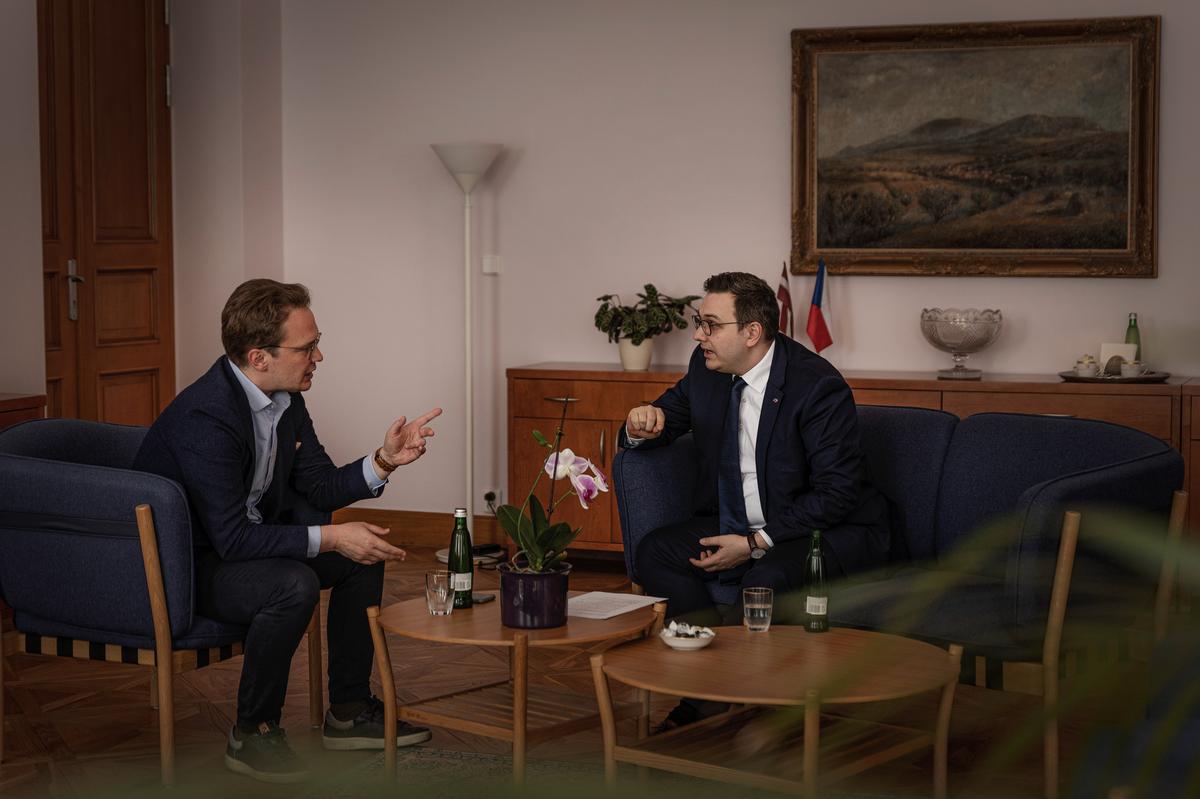
Jan Lipavský during the interview with Kirill Martynov. The Czech Embassy in Riga. Photo: Vlad Dokshin, exclusively for Novaya Gazeta Europe
It’s quite interesting, I think, for our readers to see that you emphasise this as a good example of what was done. Could you once again explain this logic of banning Russian tourists? I think the Czech Republic is probably the only country in Europe that introduced the tourist visa ban for Russian citizens which does not share a border with Russia.
But you can travel by air to Prague. You cannot drop a bomb on Ukraine and then go on vacation. This is not acceptable to Czechia. We have a program to help the Russian opposition. We act as a safe place for independent journalists, academia, and other parts of Russian society. But sadly, this is not the entire Russian society [that speaks out against war]. And for security reasons, we need to be able to distinguish [between those who support the war and those who do not].
The focus of my foreign policy is to help Ukraine to protect its sovereignty and territorial integrity, not to be another region ruled by Moscow, but to be an independent country.
We see that some countries of the union do not follow your example. Russians can travel freely to countries like Spain, Italy, France, or Germany on a tourist visa.
You have to ask those countries why they have such a policy. But the message from Prague is clear. I don’t think that it should be possible to be on vacation in Europe after massacres in Bucha, after the destruction of Mariupol and other Ukrainian cities. And the war continues right now.
I often hear Russian citizens say: “I was not personally in Bucha, I wasn’t in Ukraine. I’m just an ordinary person inside a dictatorship regime. I had no choice. I did not do anything wrong, but I was banned by the Czech Republic.” What do you say to that?
I’d say that there is no proper way to distinguish [between those who support the war and other Russian tourists]. And of course, we are fully obliged to the international law.
So if anybody is seeking asylum, we are ready to proceed very carefully.
For a few years, there was an opinion that there are some Czech politicians who are at least in part very complementary to President Putin.
Not anymore.
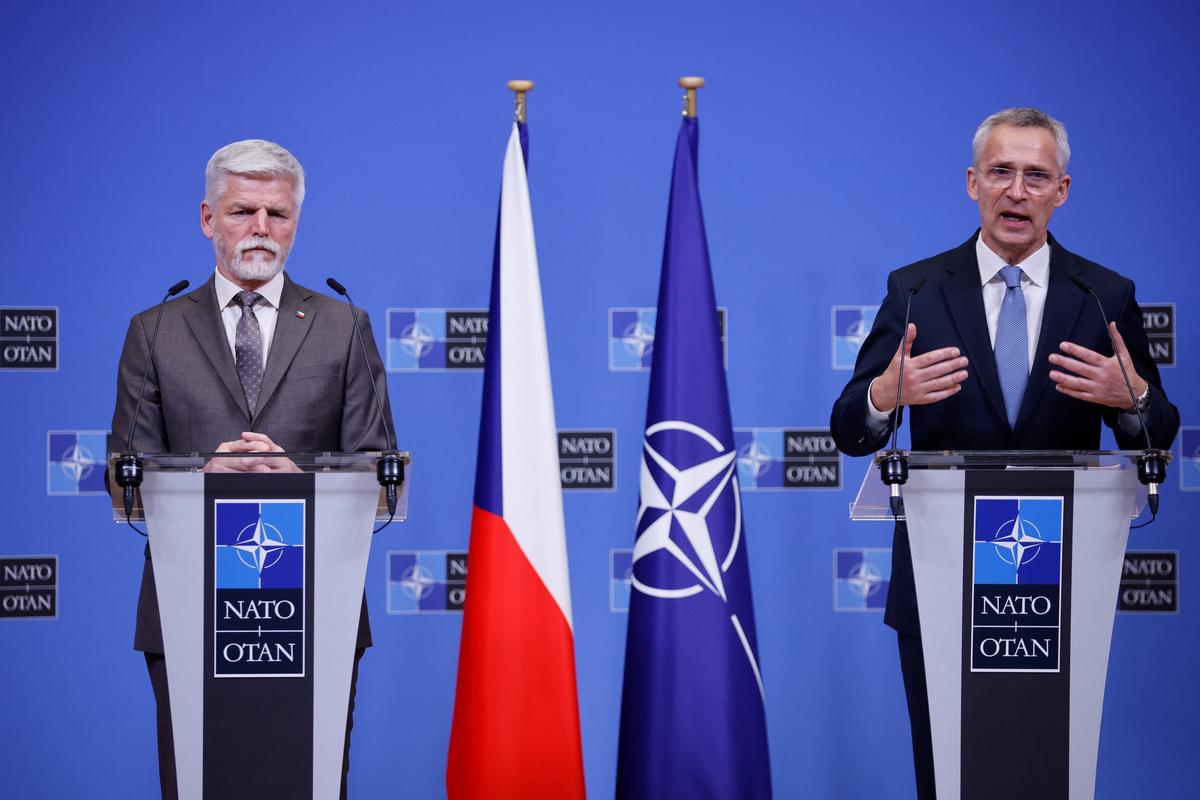
NATO Secretary General Jens Stoltenberg (on the right) and Czech President Petr Pavel make a joint statement for the media at the NATO headquarters in Brussels, Belgium, 19 April 2023. Photo: REUTERS/Johanna Geron
Can you explain what changed?
We have a new president. We held elections. Miloš Zeman is gone and now we have a new president Petr Pavel, who has a very clear vision on what the foreign policy of Czechia should be. He served as the head of the military commission in NATO. So definitely, it’s not necessary to explain to him what Russia and its imperialistic behaviour means for Central and Eastern Europe.
If you have a new president, I can suppose that there was a shift in public opinion as well?
Petr Pavel was elected by a clear majority. So definitely there is no pro-Russian majority in Czechia, it’s a marginal piece of the population. No one wants to be ruled from Moscow.
But President Zeman wasn’t for Russia in the sense that he would have liked to have the country close to the Russian orbit. He was just surrounded by certain groups that wanted to do business with Russia. And they thought that bowing and making certain symbolic moves towards Russia would help them to do business. And the rest of the country opposed that very much. So they were not successful. I’m glad that nothing has materialised [from that].
I can imagine that the Czech Republic doesn’t have any people who want to have anything in common with Russia these days. Is it because of the war or did it happen before? Because we have had some terrible political scandals in our relations, even in recent years.
1968. The year the Russian army came to occupy us. Everybody remembers that. This is the moment when any positive relationship between Russia and the Soviet Union, which came with the end of WWII, definitely ended. Because we don’t want to be colonised by Russian imperialistic ambitions. This is the clear message that we are emanating and sending in every possible way.
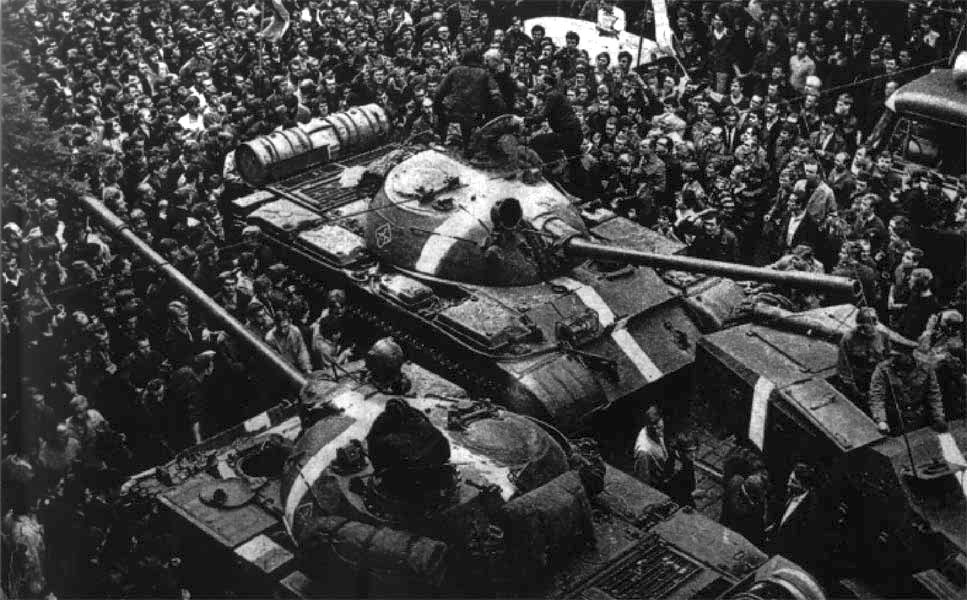
Soviet T-55 tanks during Operation Danube, 1968. Photo: Wikimedia Commons, CC BY-SA 3.0
I can imagine that you have quite a high level of solidarity with Ukrainians.
Absolutely.
Sorry for putting it this way, but could you try to explain to the Russian audience why occupation is so bad? Because the Russian propaganda says: “You can be under the Americans or under us. We have some good sides. And America has some bad sides.” Imagine a regular Russian person who doesn’t know much about occupation and the history of the Czech Republic, asking this question. They see your clear position, but they don’t fully understand what kind of experience your nation has and why you have such a high level of solidarity with Ukraine these days.
The freedom and sovereignty of Ukraine is very much connected to the freedom of my country. Listen to what the Russian propaganda says on TV every day. They name different Western cities, they talk about launching rockets at Washington. Is it meant for real? I fear that for years, the propaganda has spoken the same about Ukraine, with full agreement of the Kremlin. And now we see that bombs are falling on Ukrainian cities every day.
If Ukraine fell… It will never happen, though, because Ukraine will win and it will protect its territorial integrity and sovereignty, including Crimea.
But if Ukraine fell, who would be next? Look at the map. This is why I am sending a clear message that we are not interested in being ruled from Moscow.
We don’t want to be part of Russia. Ukrainians made a clear decision that they want to be part of this [Western] society, and I am ready to help them to defend themselves from Russian imperialism. I do not blame any single citizen for that. I blame Russian imperialism which needs to be rooted out, because this is what endangers my country and the way we live.
And look, I don’t see anyone fleeing from Paris, Germany, or the US into Russia. But I know that the children of Russian propagandists and officials live in Europe. So maybe even the average Russian citizen could try to think why the crooked and corrupt Russian leadership sends all that money abroad. Because even then, they don’t believe in the system which they are trying to keep alive. And what will happen to thousands and tens of thousands of people who they are sending to certain death in Ukraine? Ukraine will defend itself. Ukraine will fight until it fully restores its sovereignty.
And one more thing. There are half a million Ukrainian refugees in Czechia. They came here escaping Russian bombs. It’s hard for me to imagine that they would be meeting with Russians on vacation. Having drinks, massage. I don’t think that it makes sense. So it’s [entry ban for Russian tourists] quite a clear decision for us.
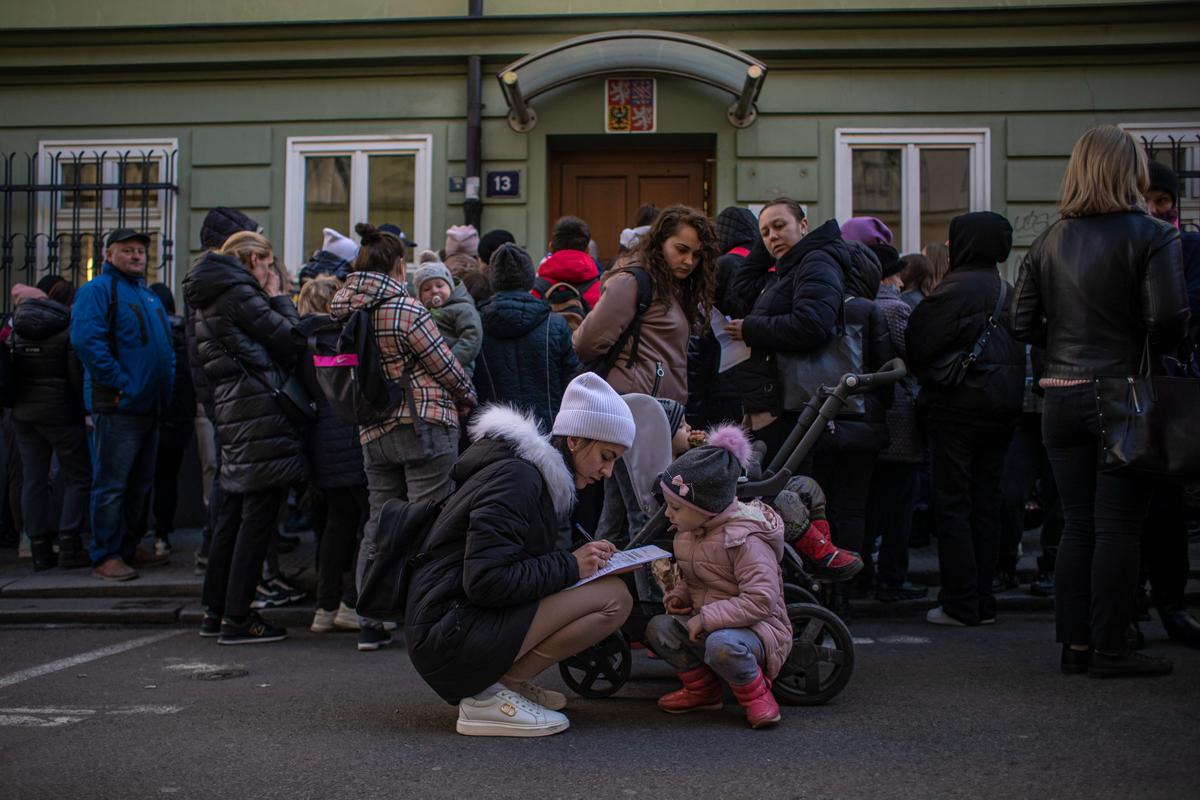
Ukrainian refugees near an employment centre in Prague, Czech Republic. 22 March 2022. Photo: EPA-EFE/MARTIN DIVISEK
We know that some Ukrainians don’t have any other way to escape from the war than to leave Ukraine and go to Russia. And then some Russians might ask: what’s the problem? On a daily basis, Ukrainians meet with Russians [inside Russia] and it’s more or less okay.
Do you know what happened to that little Russian girl who made a picture with the Ukrainian flag? Was it okay? If it was okay, then that girl and her family wouldn’t be persecuted in such a way.
It’s a complicated question: why do we still have some migration from Ukraine to Russia?
I have seen quite a lot of abduction, and especially in the case of little kids, it is really ugly. And I’m glad that the International Court of Justice issued those warrants for Putin and the woman [Russian Children’s Rights Commissioner Maria Lvova-Belova] responsible for that [child abduction]. They must be held responsible.
It seems like we don’t have enough time right now to discuss the topic of Ukrainians in Russia in greater detail. So I wanted to ask another question about the Czech presidency [at the Council of the EU]. Is there something that you would have changed if you had the opportunity to go back?
Honestly, I would not change anything. I think it was a great success. And we really achieved almost everything we designed. I feel quite content with the way that we showed leadership in Europe.
When I prepared for the interview, I wanted to start with the question about supporting Ukraine because for me personally, it’s a much more important question than the visa ban. What do you think about the Czech Republic’s support of Ukraine? Was it enough? Is there a possibility to do better? If I’m not mistaken, President Petr Pavel said in a statement that you don’t have any opportunities to provide additional military equipment for Ukraine.
We are helping as much as possible. The most important part is the military aid. So we are sending tanks, ammunition, and we are helping to train Ukrainian soldiers, because it’s a war. Ukraine needs to defend itself from the Russian imperialist invasion. Russia must understand the language of force.
Because I think with our support, Ukraine has made it clear that they are not interested in the Russian army being present in Ukraine. And we are doing everything we can so that Ukraine will win the fight for freedom.
Of course, we are looking for new ways to help Ukraine militarily. The most effective way is to do it together [with other EU states]. So we are looking for European solutions to have a higher production of ammunition.
This is one of the projects, but this is not the only way we are helping Ukraine. We are sending a lot of humanitarian aid because Russia targets Ukraine’s energy infrastructure. They tried to freeze out Ukraine in a very inhuman way, and they failed.
We are ready for the future reconstruction of Ukraine. There is a lot that needs to be rebuilt, because there is a lot of destruction. And of course, we are helping economically because Ukraine’s economy is in peril. Russia had closed the Black Sea and was trying to starve the world, disallowing the export of Ukraine grain out of Odesa. Thankfully, we have negotiated a deal, so I will be very closely following if Russia agrees to continue the deal.
And politically, we want to have Ukraine as a member of NATO and the EU. Those are future plans. It won’t happen overnight. But if the Ukrainians decide that they want to be part of a free society, I feel that it is our duty to help them.
You’ve already mentioned refugees: do they settle well in Czechia?
They are very welcome in Czechia. Some of them were able to return to Ukraine, some of them not, because whole cities were erased by Russian bombs. It’s a sad reality. And we have provided them with the basic means to live in Czechia. I hope that when the war ends and the Russian army leaves Ukraine, they will be able to return to their homes, because I think that everyone wants to live in their home with their family.
Does the country pay a high price economically for supporting Ukraine and as a consequence of the war?
Not really. The whole of Europe is struggling with certain economic issues. Of course, Putin tried to blackmail us, using energy as a weapon. It completely failed. Yes, we are currently dealing with high inflation. But I believe that we’ll be able to solve these issues.
It’s important to note that Putin undercut the energy and the future income of Russia. Russia cannot be a reliable energy source anymore. He destroyed Russia’s reputation for decades.
But it’s up to Russian citizens to hold him responsible for this in the future. And of course, for the horrors of war he unleashed on all of Ukraine and its people.
Naturally, it’s insane to support this war. But are there still people in Czechia who say: let’s stop helping Ukraine because we have some internal problems and we have to put ourselves first?
We have a vivid political debate because we are a free and democratic society. So it’s allowed to have a debate and to share a different opinion, even if it differs from the main line. And people do not get killed or sent to labour camps for that. On the other side, the majority of society understands Czechia’s need to protect its security and supports our government. You can point to different examples when people show different opinions, but it will not change the resolute and clear stance of my government, which will always take care of Czechia’s security.
Let’s talk about Russian dissidents. I think you are doing an amazing job helping these people — I’m not sure we can mention the specific examples that you know very well here. But I want to ask, what is your stance on this help? Is it just for humanitarian reasons, or do you see some pragmatics here? Is it just about saving people’s lives and freedom or can you see these groups of people you are supporting possibly changing the situation in Russia in the future?
I see a big future here. There is a famous quote by Andrei Sakharov that the Kremlin would treat its neighbours in the same way it treats its citizens. And I think it’s very important that we give a helping hand to Russian citizens who care about society in Russia and who could change the way the Kremlin behaves towards its citizens.
And the groups, communities, independent historians and academics who we are helping are exactly the ones who want to change the way the Kremlin treats its citizens. And if that changes in Russia, we will feel much safer in Prague. It’s not something that would endanger Russia as such, but it might endanger Russian imperialism, which I would like to see more of.
We’ve mentioned Russian imperialism several times during our conversation. How can it be possible that for almost a hundred years, it has persevered? We thought it was about Soviet communism, but it looks like it’s not.
Russian citizens should be the ones who decide what is the fate of Russia. It cannot be dictated from outside. I don’t know what is the proper way to solve this issue. But currently I know that I need to protect Europe from it.
What do you think about the nature of this imperialism? What could have caused it?
There is a lot of political and a historical debate on that. And I don’t have an answer which would fit into this interview.
The simplest answer that we often hear is that there’s something wrong with the nature of Russians: it’s like we always want to do something evil to the neighbours and to ourselves. I can fully understand why Ukrainians say that all the Russians will somehow support this imperialist worldview and that’s why they will always be dangerous to their neighbours. But I’m not sure if it really works like this, if we really have some internal traits like that.
I’m not a fan of such theories. I think there is no clear or simple answer to that. And history provides different examples of countries switching to democracies. And I wish that one day, there will be democracy in Russia.
There has been a lot of discussion about the possible future of Europe these days. The EU seems to be a much stronger organisation than the Russian propaganda thought it was. But obviously, we will face a lot of problems during this war and after it. Many people say that the role of Central Europe in the EU is expanding. Countries like Poland and the Czech Republic, for example, play a greater role in the union than before — because of their experience in the 20th century, because of their tough stance against this aggression, and because they have become the leaders behind important political decisions. What do you think about the future and the role of your country?
I think this notion is a little bit skewed by the Russian war against Ukraine. But we try to do our job in the EU. The EU is very strong and will be stronger.
And the EU is a peace project. The European community was founded as a peace project. Then the branch of economic cooperation led to a thriving Europe. Central and Eastern European countries are happy that they can have a share of that prosperity. Besides, we have the two biggest economies, Germany and France, and their role will firmly remain. We have a lot of debate in Europe, but we also have a lot of agreements.
You can address the Russian readers here, if you want.
I wish that there would be peace in Ukraine. I wish that Ukraine would be without Russian soldiers. I wish that the killing would stop.
Join us in rebuilding Novaya Gazeta Europe
The Russian government has banned independent media. We were forced to leave our country in order to keep doing our job, telling our readers about what is going on Russia, Ukraine and Europe.
We will continue fighting against warfare and dictatorship. We believe that freedom of speech is the most efficient antidote against tyranny. Support us financially to help us fight for peace and freedom.
By clicking the Support button, you agree to the processing of your personal data.
To cancel a regular donation, please write to [email protected]
